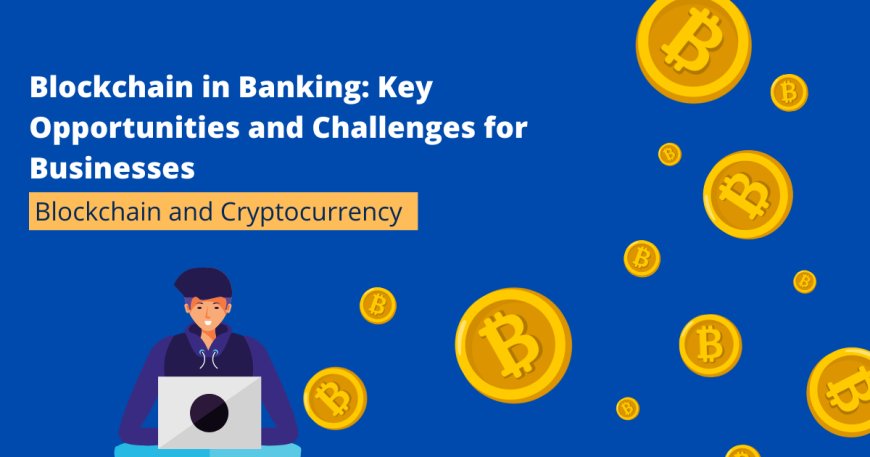Blockchain in Banking: Key Opportunities and Challenges for Businesses
This comprehensive article will explore how blockchain technology is reshaping banking. We’ll dive into the major opportunities it provides for businesses, the potential challenges to widespread adoption, and why companies in the financial sector should prepare for a future where blockchain is integrated into core systems.

Blockchain technology is transforming industries worldwide, and banking is no exception. As financial institutions look for ways to improve transparency, reduce costs, and enhance security, blockchain stands out as a revolutionary force. Yet, while the benefits of blockchain are immense, the technology also presents unique challenges, especially within the highly regulated and risk-averse banking industry.
For those interested in building customized blockchain solutions, working with a blockchain app development company can streamline this integration and address unique challenges along the way.
What Is Blockchain Technology?
Blockchain is a distributed ledger technology that records transactions across a network of computers. Unlike traditional databases, blockchain is decentralized, meaning no single entity has control over the entire chain. Each block in the chain contains a record of several transactions, and every block is linked (or “chained”) to the previous one, creating an immutable, transparent record.
In banking, blockchain’s decentralized structure offers several critical advantages. It can help reduce fraud, enhance transparency, and streamline financial transactions, making it particularly appealing to an industry built on trust and accuracy.
The Growing Importance of Blockchain in Banking
As digital transformation sweeps across the financial services sector, blockchain technology has become more relevant than ever. According to industry reports, blockchain applications could save banks up to $20 billion per year by 2025. The ability to lower operational costs, improve data accuracy, and bolster security are just some of the reasons banks are investing in blockchain research and pilot projects. Working with a blockchain app development company can also accelerate the deployment of blockchain solutions, enabling banks to stay competitive in a rapidly evolving landscape.
Furthermore, the COVID-19 pandemic has accelerated the shift to digital banking solutions, highlighting the need for secure, efficient, and transparent systems. Blockchain, with its decentralized nature and tamper-proof capabilities, stands poised to meet this need.
Key Opportunities of Blockchain for Businesses in the Banking Sector
1. Enhanced Security and Fraud Reduction
One of the primary benefits of blockchain in banking is improved security. Each transaction on a blockchain is encrypted and validated by multiple nodes, making it highly resistant to tampering. This is especially valuable in combating fraud, which costs banks billions each year. By decentralizing transaction data, blockchain makes it far more difficult for hackers to corrupt financial records.
2. Streamlined Cross-Border Payments
Cross-border payments are notorious for being slow and expensive. Banks must work through intermediaries, which increases both the cost and the time needed to process these transactions. Blockchain technology enables direct peer-to-peer payments, bypassing the need for intermediaries and significantly reducing transaction times and fees. Blockchain app development services can assist banks in customizing solutions like Ripple, a prominent blockchain network, to streamline cross-border payments.
3. Improved KYC and AML Compliance
Know Your Customer (KYC) and Anti-Money Laundering (AML) regulations require banks to verify the identity of their clients. This process is often repetitive and costly, as banks must continually update and verify client information. Blockchain can streamline these processes by allowing banks to securely share verified customer data on a decentralized ledger, reducing redundancies and lowering compliance costs. Blockchain app development services can help create tailored solutions that address these regulatory requirements efficiently.
4. Increased Transparency and Auditability
Blockchain’s transparent nature makes it an ideal solution for enhancing trust between banks and customers. Every transaction is recorded and visible to authorized parties, enabling complete traceability. This level of transparency simplifies auditing processes and can help prevent malfeasance by creating a clear, unalterable trail of transactions.
5. Automation Through Smart Contracts
Smart contracts are self-executing contracts with the terms of the agreement written directly into code. In banking, smart contracts can automate tasks like loan disbursements, collateral management, and insurance claims, reducing manual effort and human error. This level of automation can significantly enhance operational efficiency and reduce administrative costs. Partnering with a blockchain app development company enables banks to design and deploy smart contracts tailored to their specific needs.
6. Tokenization of Assets
Tokenization refers to creating a digital representation of an asset, such as real estate or bonds, on a blockchain. In banking, tokenization can allow for fractional ownership of high-value assets, making them more accessible to a broader audience. This can democratize investment opportunities and allow banks to offer new, innovative products to clients.
7. Cost Reductions in Data Storage and Reconciliation
Banks spend significant resources on data storage and reconciliation processes, which ensure that records are accurate and up-to-date. Blockchain’s single, immutable ledger can eliminate the need for these labor-intensive processes, reducing costs and freeing up resources for other initiatives.
Challenges to Blockchain Adoption in Banking
1. Regulatory Compliance and Uncertainty
One of the largest barriers to blockchain adoption in banking is regulatory uncertainty. Blockchain’s decentralized structure poses challenges for regulatory frameworks that were designed for centralized systems. Banks need clear regulatory guidance to implement blockchain solutions fully and to remain compliant with existing laws. A reputable blockchain app development company can assist in navigating these complexities by providing solutions designed with compliance in mind.
2. Integration with Legacy Systems
Banks often rely on complex, outdated legacy systems for their core operations. Integrating blockchain with these systems is a complex and costly task. Without significant upgrades, blockchain’s potential to enhance banking processes remains limited. Blockchain app development services can ease this transition by creating solutions compatible with legacy systems, allowing for smoother integration.
3. Privacy Concerns
While blockchain offers transparency, it also raises privacy concerns. In a decentralized system, data is visible to all participants in the network. This level of transparency can conflict with data privacy regulations like the GDPR, which require strict protection of personal data.
4. Scalability Issues
Blockchain networks can face scalability challenges, especially when handling high transaction volumes. Traditional databases process transactions quickly, whereas blockchain technology, especially public blockchains, can be slower. Solutions like Layer 2 scaling and sharding are being developed to improve blockchain’s scalability, but these technologies are still in their early stages. Partnering with a blockchain app development company can help banks implement scalable blockchain solutions that grow alongside their business needs.
5. High Initial Costs
The cost of implementing blockchain solutions can be prohibitive, especially for smaller banks. While the technology may yield long-term savings, the upfront costs of infrastructure, training, and integration are substantial. These costs can be a significant barrier, particularly for financial institutions with limited budgets.
6. Energy Consumption
Many blockchain networks, particularly those that use Proof of Work (PoW), require substantial energy resources. Given the global emphasis on sustainability, high energy consumption can be a drawback for banks looking to adopt blockchain. The rise of Proof of Stake (PoS) and other energy-efficient consensus mechanisms may offer solutions, but these are not yet universally adopted.
7. Limited Expertise
Blockchain is a relatively new technology, and there is a limited pool of professionals with the expertise needed to implement and manage blockchain systems. Banks must invest in recruiting and training blockchain talent, which can be both time-consuming and expensive. Leveraging the expertise of a blockchain app development company can help bridge this talent gap and provide banks with access to seasoned professionals.
The Future of Blockchain in Banking
Despite the challenges, the future of blockchain in banking looks promising. Banks worldwide are exploring blockchain solutions and partnering with fintech companies and blockchain app development services to develop secure, efficient, and innovative services. As the technology matures, we can expect to see more widespread adoption, particularly as regulatory frameworks become clearer and solutions to scalability issues are developed.
Blockchain has the potential to redefine banking, creating a more transparent, efficient, and secure financial system. By understanding the opportunities and challenges it presents, banks can position themselves at the forefront of this technological revolution.
Conclusion
Blockchain technology is reshaping the banking industry in profound ways, offering significant opportunities for businesses seeking increased security, efficiency, and transparency. From reducing fraud and streamlining cross-border payments to enhancing KYC processes and enabling smart contracts, blockchain’s potential benefits are extensive.
However, challenges such as regulatory uncertainty, integration difficulties, and scalability limitations must be carefully managed to unlock blockchain’s full potential in banking. Partnering with a blockchain app development company can simplify the adoption process, ensuring compliance, scalability, and smooth integration with existing systems.
In the coming years, blockchain’s influence on banking will only grow, driving innovation and efficiency. Banks that embrace this change will be better equipped to meet the demands of the digital age and maintain a competitive edge in an evolving financial landscape.
What's Your Reaction?
















![Noots Focus Reviews [Truth Exposed 2025]!](https://news.bangboxonline.com/uploads/images/202501/image_430x256_678e3b94881a1.jpg)
![Vivalis Male Enhancement: The Must-Know Ingredients [2025 Update]](https://news.bangboxonline.com/uploads/images/202501/image_430x256_678e3b54e396c.jpg)










